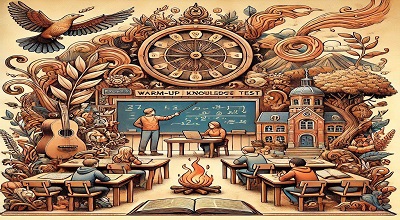Warm-Up & Previous Knowledge Test
Warm-up and previous knowledge test are two terms that are often used in education and training. A warm-up is a short activity that prepares the learners for the main lesson or task by activating their prior knowledge, engaging their interest, and motivating them to learn more.
A previous knowledge test is an assessment that measures the learners’ existing knowledge. Or skills on a topic before they start a new lesson or task. The purpose of a previous knowledge test is to identify the learners’ strengths and weaknesses. Inform the instruction and feedback, and evaluate the learning progress and outcomes.
Different Warm-up & Previous Knowledge Tests
There are many types of warm-up and previous knowledge test activities. That can be used in different contexts and subjects. Some examples are:
Brainstorming: The learners generate and share ideas related to the topic of the lesson or task. This helps them activate their prior knowledge, stimulate their curiosity, and create connections between the new and the old information. For example, before a lesson on climate change, the learners can brainstorm the causes, effects, and solutions of this global issue.
Quiz: The learners answer multiple-choice, true-false, or short-answer questions related to the topic of the lesson or task. This helps them assess their prior knowledge, identify their gaps, and review the key concepts and terms. For example, before a lesson on fractions, the learners can take a quiz on the basic operations and properties of fractions.
Interview: The learners ask and answer questions related to the topic of the lesson or task with a partner or a group. This helps them practice their communication skills, express their opinions and experiences, and learn from each other. For example, before a lesson on hobbies, the learners can interview each other about their favorite hobbies and why they enjoy them.
More here…
Simulation: The learners perform a realistic task or scenario related to the topic of the lesson or task. This helps them apply their prior knowledge, develop their problem-solving skills, and explore the real-world relevance of the topic. For example, before a lesson on budgeting, the learners can simulate a shopping trip and calculate their expenses and savings.
Reflection: The learners write or discuss their thoughts and feelings related to the topic of the lesson or task. This helps them activate their prior knowledge, express their emotions and attitudes, and set their goals and expectations. For example, before a lesson on poetry, the learners can write or talk about their favorite poems and what they like or dislike about them.
Final Words
These are some of the warm-up and previous knowledge test activities. That can be used to enhance the learning process and outcomes. They can be adapted and modified according to the needs. And preferences of the learners and the instructors. They can also be combined and integrated with other instructional strategies and methods. The main idea is to make the learning experience more engaging, effective, and enjoyable for everyone.
